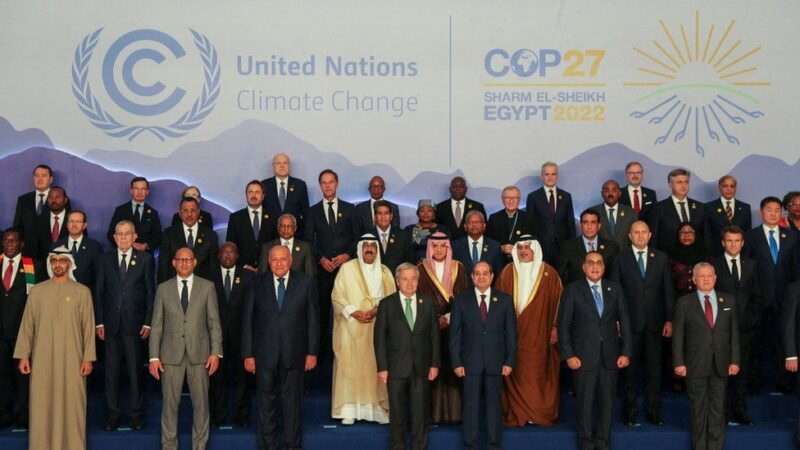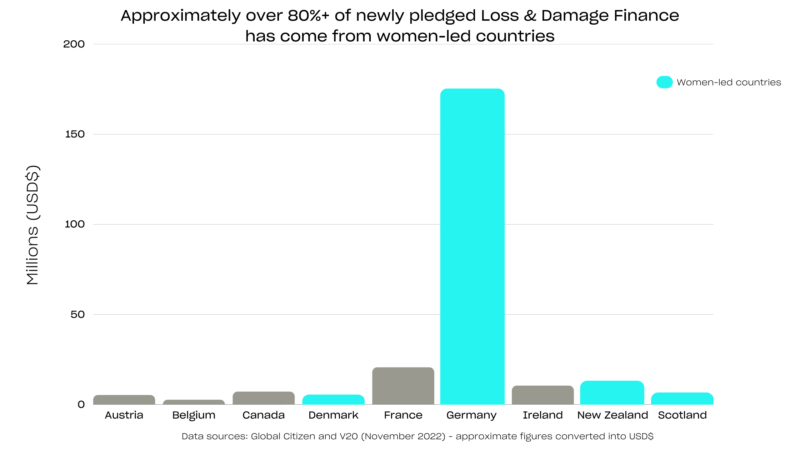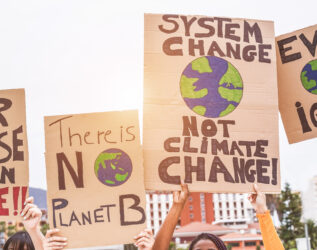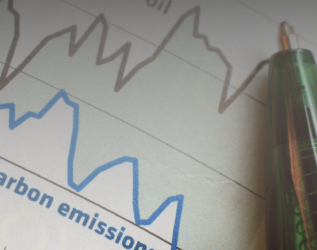COP(out)27: 3 Major questions

World leaders gathered at COP27 over the previous two weeks. We hope for positive outcomes. We are at least glad that it took place in Africa, bringing special focus to the plight of developing nations. However, there have been major shortcomings. We’d like to highlight three:
Where are all the women?
We’ve all seen this photo. It’s no surprise it went viral.

Women made up less than 34% of country negotiating teams at COP27 even though it is women who disproportionately bear the brunt of climate impacts. In fact, 80% of people displaced by climate change are women:
- New ActionAid research in Kenya, Rwanda, Zambia and Nigeria found that increased gender-based violence and deteriorating women’s mental health have been a consequence of climate change
- Human trafficking increases by around 20-30% during climate disasters – of those reportedly living in modern slavery, 71% are female
- A report from Malawi found the disruptions of climate change could create an additional 1.5 million child brides
- In Australia, bushfires trigger a spike in domestic abuse
Yet, women continue to be but a footnote in the news. If we solved this gross inequality, we could mitigate these devastating realities and generate a cascade of positive outcomes for society and the planet:
- If women smallholders received equal access to productive resources, their farm yields would rise to 20-30% and 100-150 million people would be saved from hunger
- At a local level, when women participate in natural resource management there are better resource governance and conservation outcomes
- Countries where women have higher social and political status have 12% lower emissions
- Ultimately, according to Project Drawdown, we could avoid 120 billion tons of emissions by 2050 by empowering women
How can VCs help?
Although there may not be any short term fixes for the gender imbalance at COP27, there are actions we, as VCs, can take to help improve the big picture. It’s simple, we need to invest in more women. And not just because female entrepreneurs are more likely than their male counterparts to address world issues, but also because it financially makes sense – women deliver higher returns with more than twice as much per dollar invested compared to men. There are a number of female founder networks out there including Global Invest Her, She Loves Tech and even climate specific ones like Climate Raise. We need more women in top positions and we need to put women at the heart of economic growth for a healthy and prosperous world.
Where are the rest of the climate justice pledges?
This was a bittersweet outcome of COP27. On the one hand, it is great to see that after decades of resistance, climate justice loss and damages funds were finally pledged to developing nations. On the other hand, too few have pledged. The European countries that have so far pledged include Austria, Belgium, Denmark, France, Germany, Ireland and Scotland. New Zealand and Canada have also pledged. We are proud to see our home country Germany leading the way, pledging €170 million (approximately $175.6). And although it counts for the large majority, it’s interesting to see where the finance has come from and how much has been contributed.

V20 countries (the vulnerable 20 group consisting of 58 economies) have lost a total of $525 billion to climate impacts since 2000. Sadly, what has been pledged is a drop in the ocean. The most disappointing absence of action comes from the U.S, who has only so far committed to having a conversation about loss and support damage. We hope the U.S and more countries will step up in the push for climate justice.
How can VCs help?
VCs can help by investing in climate adaptation. Although VCs don’t give out donations, they can invest in technologies that will help developing countries be better prepared for the increasing number of climate change effects. For instance, farmers will need to be able to grow crops in unpredictable and hotter conditions which can increase disease outbreak. Plantix is an example of a technology that can help improve yield through early disease detection. Outside of our portfolio, another AgTech startup that has caught our eye is Phytoform, whose technology speeds up the process of creating more diverse and future-proofed crops. We are also interested in fertilizers that can help restore degraded land.
From our Ecosystem cluster, pollution analytics platforms like Airly can provide actionable insights to help countries reduce emissions and protect public health. Outside of our portfolio, we are interested in actionable wildfire intelligence platforms like OroraTech and Pano AI. We are also actively looking for Infrastructure & Housing adaptation technologies like cooling systems, insulation and building materials.
What happened to leading by example?
Did everyone else see this image below?

To no surprise it angered many people. Interestingly, The Energy and Climate Intelligence Unit’s international lead has said that focusing on the private planes to COP27 was “missing the point” and that the emissions were insignificant compared to the commitments being made at the summit. Whilst that may be true, one of the absolute basics of leadership is to lead by example. It promotes cooperation and endows trust, which is absolutely critical in this climate (excuse the pun). What message does starting COP27 by arriving in a private jet send to the world? Why can’t world leaders lead by example and make commitments to climate action? Do we have to have one without the other?
How can VCs help?
First of all, we ourselves can lead by example. As impact VCs or VCs that have an impact angle, we need to walk the talk. At AENU, one of our six impact guidelines when screening startups is Impact Intention. Impact needs to be a core motivation. It’s just as important that we have and demonstrate the same motivation. We have an internal environmental policy with strict guidelines that aims to minimize flying time at the company level. For example, we strictly follow a “trains over planes” motto. When this is not feasible, staff are only reimbursed for economy class flights and carbon offsets are used to compensate for these emissions.
Unfortunately there will always be behavioral change issues. Another solution is investing more in sustainable aviation, for the private jetters (if it is absolutely necessary to travel this way) and the everyday traveler. Aviation accounts for 2-3% of total annual emissions. According to the World Economic Forum, if we achieved the target of 10% sustainable aviation by 2030, we would require $250 billion in investments in the next decade. Last year, according to Pitchbook research, only ≈$214.5 million was invested in sustainable aviation. VCs need to help fill this significant investment gap. We are proud investors of XFuel and ZeroAvia, who are both making significant contributions to this space.
We hope next year, our response to COP28 will be more positive. Although we are all feeling frustrated, we still have faith in impact capitalism. It goes beyond the principles of economic growth, planetary limits and social foundations. Instead, impact capitalism’s model focuses on optimizing social and environmental well-being by 1) investing in sustainable and inclusive growth and 2) creating real opportunities. It is through these two interconnected levers that we can truly achieve prosperity for people and the planet.











